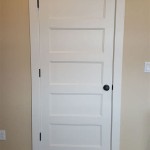How to Seal Interior Concrete Block Walls
Interior concrete block walls can be a source of dust, moisture, and even allergens. They can also be visually unappealing, often having a rough and unfinished look. Sealing these walls is a beneficial step for improving the aesthetics and functionality of a space. This process involves creating a barrier on the surface of the blocks, preventing dust and moisture from entering, and improving the overall appearance of the wall.
Considerations Before Sealing
Before embarking on the sealing process, there are some important factors to consider.
Firstly, determine the condition of the walls. If they are heavily damaged or have cracks, addressing these issues before sealing is crucial. This might involve patching cracks with mortar or using a concrete repair product.
Secondly, assess the purpose of the sealing. Is it to prevent dust and moisture, improve the appearance, or both? This will help in choosing the appropriate sealant. For instance, a clear sealant might be appropriate for aesthetics, while a moisture-resistant sealant would be better for preventing dampness.
Finally, consider the type of finish you want. A sealant can be applied on its own, but it can also be used as the base for painting or other finishes. If you plan on adding subsequent layers, ensure compatibility with the chosen sealant.
Preparation and Application
Once you've considered these factors, the next step is preparing the walls for sealing.
Start by cleaning the walls thoroughly. Use a stiff brush or a vacuum cleaner to remove loose dust and debris. If the walls are greasy or stained, use a degreaser and a damp cloth to clean them.
After cleaning, allow the walls to dry completely. This ensures proper adhesion of the sealant. If the walls are damp, consider using a moisture-resistant primer before applying the sealant.
Now, apply the sealant. Depending on the type of sealant, you can use a brush, roller, or spray application. For best results, use thin coats and allow each coat to dry completely before applying another. Ensure you follow the manufacturer's guidelines for drying time.
Types of Sealants for Concrete Block Walls
There are several types of sealants suitable for concrete block walls, each with its own advantages and disadvantages.
Acrylic Sealers
Acrylic sealers are water-based, making them easy to apply and clean up. They offer good adhesion, moisture resistance, and durability. However, they are not as resistant to UV rays as some other types of sealants.
Epoxy Sealers
Epoxy sealers are two-part systems that require mixing before application. They are highly durable and resistant to chemicals, moisture, and abrasion. Epoxy sealers are also UV-resistant, making them a good option for exterior walls.
Silane-Siloxane Sealers
Silane-siloxane sealers are a popular choice for concrete walls. They offer good moisture resistance, breathability, and UV resistance. They are also easy to clean and maintain.
Polyurethane Sealers
Polyurethane sealers are an excellent option for sealing concrete block walls against moisture. They offer excellent adhesion, durability, and resistance to UV rays. However, they can be difficult to apply and may require professional installation.
Choosing the right type of sealant depends on the specific needs of the project. Consider factors such as budget, environmental conditions, and desired properties when making your choice.
By following these steps and considering the important factors, you can effectively seal your interior concrete block walls, improving their appearance, functionality, and overall quality.

11 Concrete Block Waterproofing Tips Polyguard Residential

Waterproofing Basement Walls Dos And Don Ts To Remember Bob Vila

How To Seal Dustproof An Exposed Internal Brick Or Masonry Wall Floorseal

How To Scratch Coat A Cinder Block Wall Just In Case

Surface Matters Block Honing Coatings And Flooring S For Concrete

How To Seal Dustproof An Exposed Internal Brick Or Masonry Wall Floorseal

10 Ways To Cover Concrete Walls In A Basement Finish

Painting Cinder Block Walls In A Basement Or Re Paint Them

Interior Brick Sealer Dustproofer Prosoco

Waterproofing Basement Walls Dos And Don Ts To Remember Bob Vila
Related Posts








